Case Study Report: Unilever PLC Sustainability Strategy Analysis
VerifiedAdded on 2022/01/19
|10
|2394
|431
Case Study
AI Summary
This case study report critically analyzes the sustainability strategy of Unilever PLC, a British multinational consumer goods company. It examines Unilever's current strategy, the Unilever Sustainable Living Plan (USLP), and its impact on environmental and financial aspects, highlighting both successes and challenges. The report details issues such as volatile business environments, shrinking market demand, and shortcomings in controlling greenhouse gas emissions and water usage, along with accusations of unethical practices. It then recommends a new sustainability strategy focusing on a fully integrated corporate culture built on core beliefs of company objectives, brand growth, and sustainable techniques. The recommended strategy emphasizes institutional quality, environmental impact reduction, and various benefits including climate protection, income equality, protection of natural resources, human rights, and pollution control. The report concludes with a comprehensive overview of the company's sustainability efforts and suggestions for future improvements.
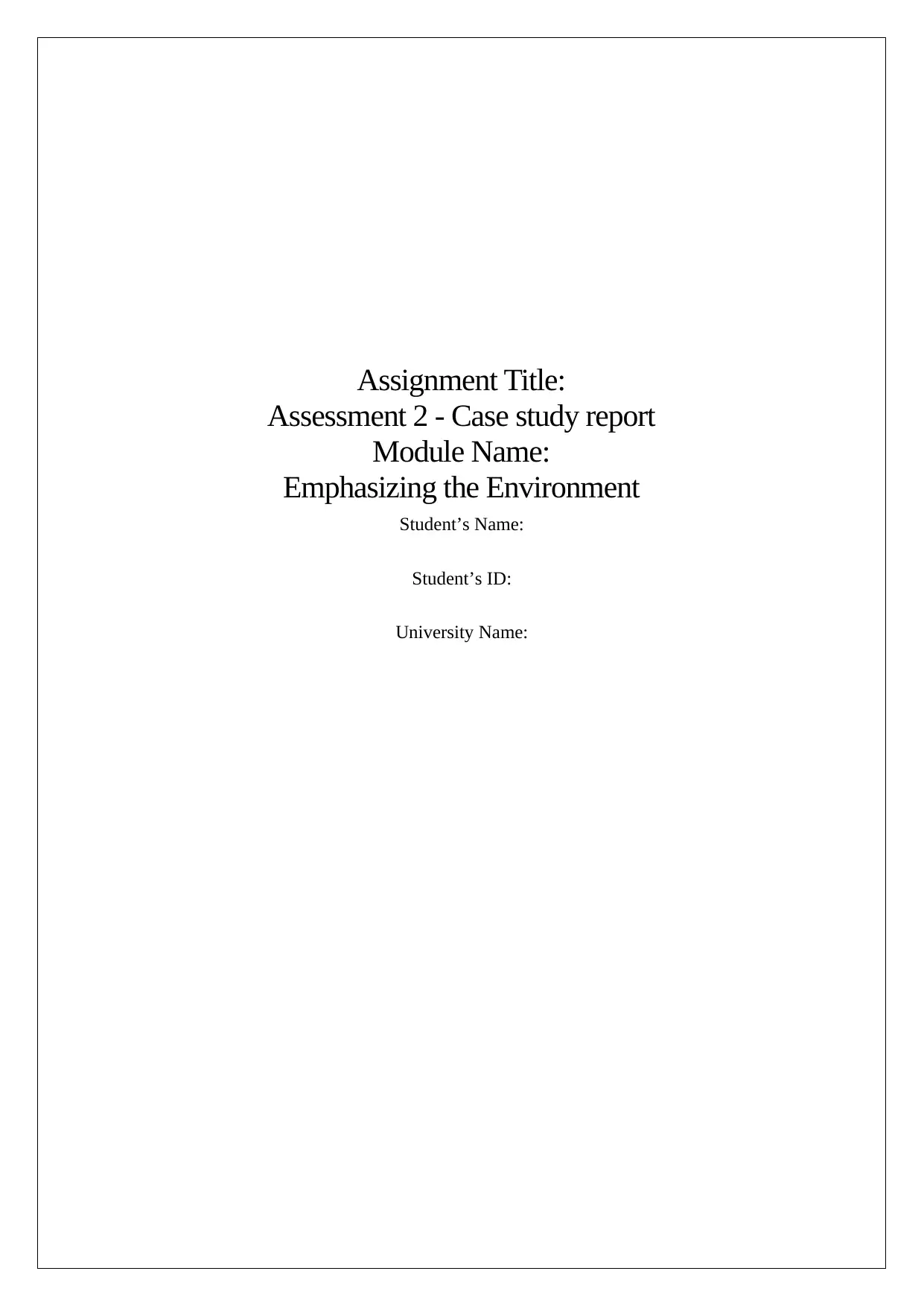
Assignment Title:
Assessment 2 - Case study report
Module Name:
Emphasizing the Environment
Student’s Name:
Student’s ID:
University Name:
Assessment 2 - Case study report
Module Name:
Emphasizing the Environment
Student’s Name:
Student’s ID:
University Name:
Paraphrase This Document
Need a fresh take? Get an instant paraphrase of this document with our AI Paraphraser
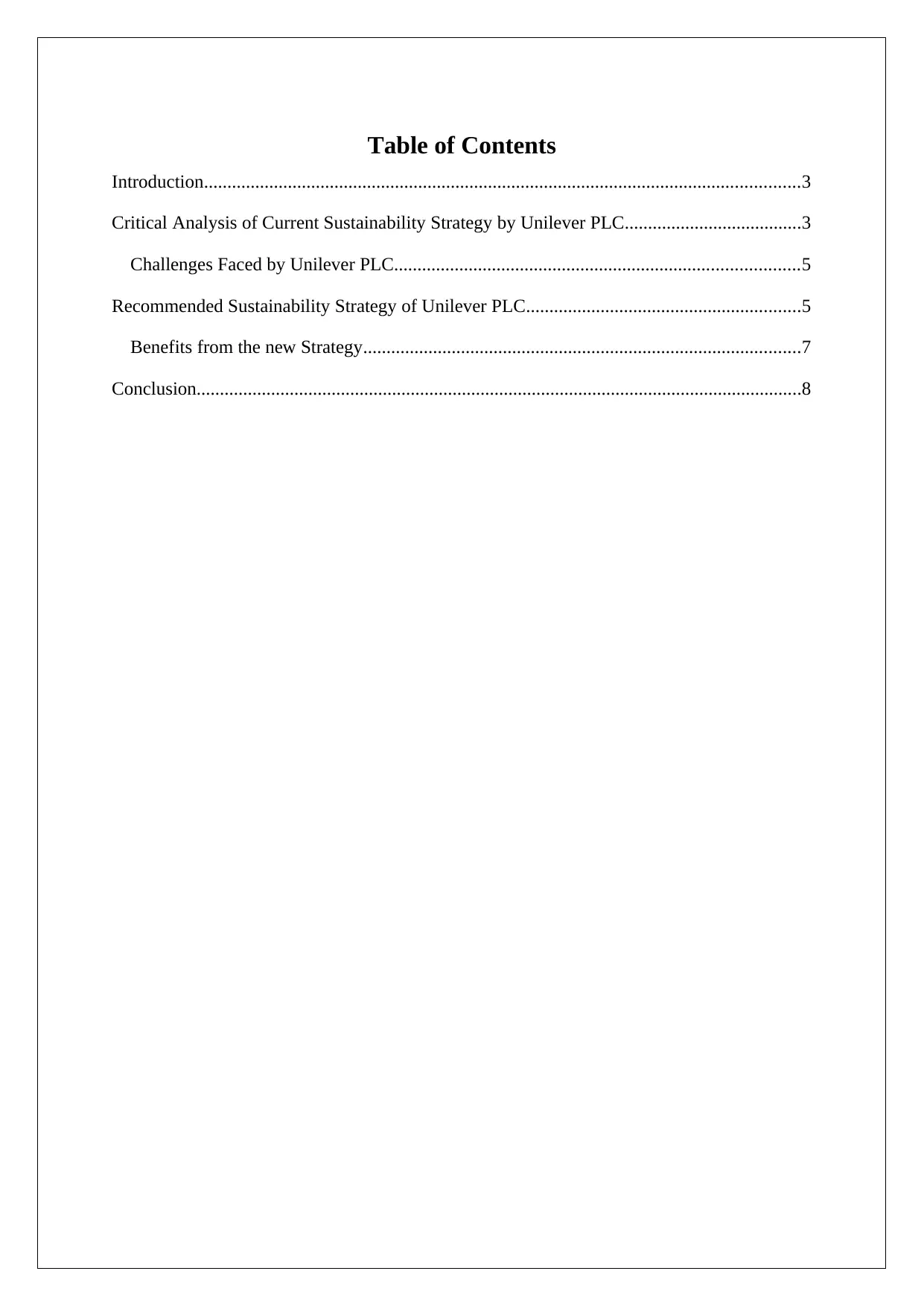
Table of Contents
Introduction................................................................................................................................3
Critical Analysis of Current Sustainability Strategy by Unilever PLC......................................3
Challenges Faced by Unilever PLC.......................................................................................5
Recommended Sustainability Strategy of Unilever PLC...........................................................5
Benefits from the new Strategy..............................................................................................7
Conclusion..................................................................................................................................8
Introduction................................................................................................................................3
Critical Analysis of Current Sustainability Strategy by Unilever PLC......................................3
Challenges Faced by Unilever PLC.......................................................................................5
Recommended Sustainability Strategy of Unilever PLC...........................................................5
Benefits from the new Strategy..............................................................................................7
Conclusion..................................................................................................................................8
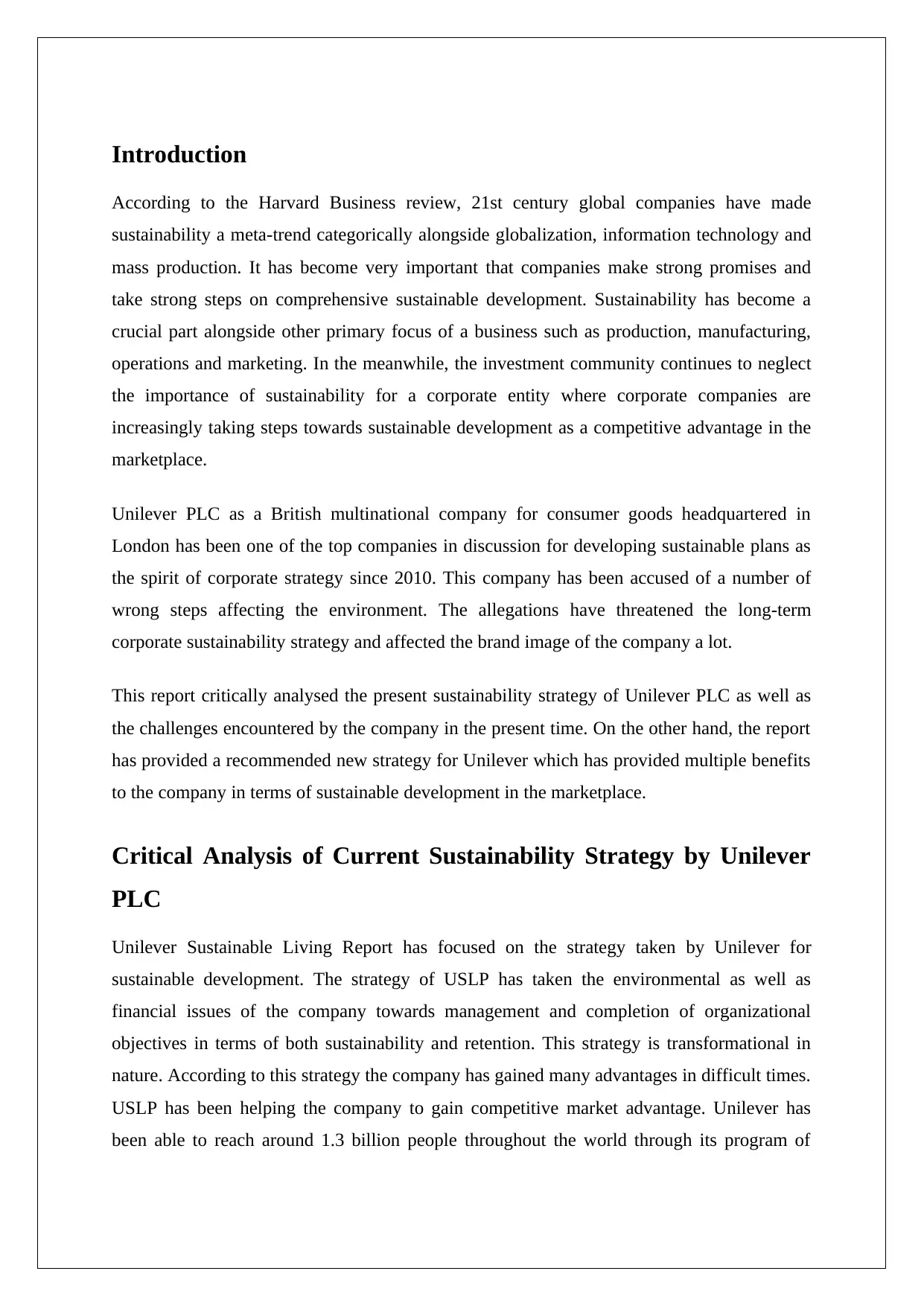
Introduction
According to the Harvard Business review, 21st century global companies have made
sustainability a meta-trend categorically alongside globalization, information technology and
mass production. It has become very important that companies make strong promises and
take strong steps on comprehensive sustainable development. Sustainability has become a
crucial part alongside other primary focus of a business such as production, manufacturing,
operations and marketing. In the meanwhile, the investment community continues to neglect
the importance of sustainability for a corporate entity where corporate companies are
increasingly taking steps towards sustainable development as a competitive advantage in the
marketplace.
Unilever PLC as a British multinational company for consumer goods headquartered in
London has been one of the top companies in discussion for developing sustainable plans as
the spirit of corporate strategy since 2010. This company has been accused of a number of
wrong steps affecting the environment. The allegations have threatened the long-term
corporate sustainability strategy and affected the brand image of the company a lot.
This report critically analysed the present sustainability strategy of Unilever PLC as well as
the challenges encountered by the company in the present time. On the other hand, the report
has provided a recommended new strategy for Unilever which has provided multiple benefits
to the company in terms of sustainable development in the marketplace.
Critical Analysis of Current Sustainability Strategy by Unilever
PLC
Unilever Sustainable Living Report has focused on the strategy taken by Unilever for
sustainable development. The strategy of USLP has taken the environmental as well as
financial issues of the company towards management and completion of organizational
objectives in terms of both sustainability and retention. This strategy is transformational in
nature. According to this strategy the company has gained many advantages in difficult times.
USLP has been helping the company to gain competitive market advantage. Unilever has
been able to reach around 1.3 billion people throughout the world through its program of
According to the Harvard Business review, 21st century global companies have made
sustainability a meta-trend categorically alongside globalization, information technology and
mass production. It has become very important that companies make strong promises and
take strong steps on comprehensive sustainable development. Sustainability has become a
crucial part alongside other primary focus of a business such as production, manufacturing,
operations and marketing. In the meanwhile, the investment community continues to neglect
the importance of sustainability for a corporate entity where corporate companies are
increasingly taking steps towards sustainable development as a competitive advantage in the
marketplace.
Unilever PLC as a British multinational company for consumer goods headquartered in
London has been one of the top companies in discussion for developing sustainable plans as
the spirit of corporate strategy since 2010. This company has been accused of a number of
wrong steps affecting the environment. The allegations have threatened the long-term
corporate sustainability strategy and affected the brand image of the company a lot.
This report critically analysed the present sustainability strategy of Unilever PLC as well as
the challenges encountered by the company in the present time. On the other hand, the report
has provided a recommended new strategy for Unilever which has provided multiple benefits
to the company in terms of sustainable development in the marketplace.
Critical Analysis of Current Sustainability Strategy by Unilever
PLC
Unilever Sustainable Living Report has focused on the strategy taken by Unilever for
sustainable development. The strategy of USLP has taken the environmental as well as
financial issues of the company towards management and completion of organizational
objectives in terms of both sustainability and retention. This strategy is transformational in
nature. According to this strategy the company has gained many advantages in difficult times.
USLP has been helping the company to gain competitive market advantage. Unilever has
been able to reach around 1.3 billion people throughout the world through its program of
⊘ This is a preview!⊘
Do you want full access?
Subscribe today to unlock all pages.

Trusted by 1+ million students worldwide
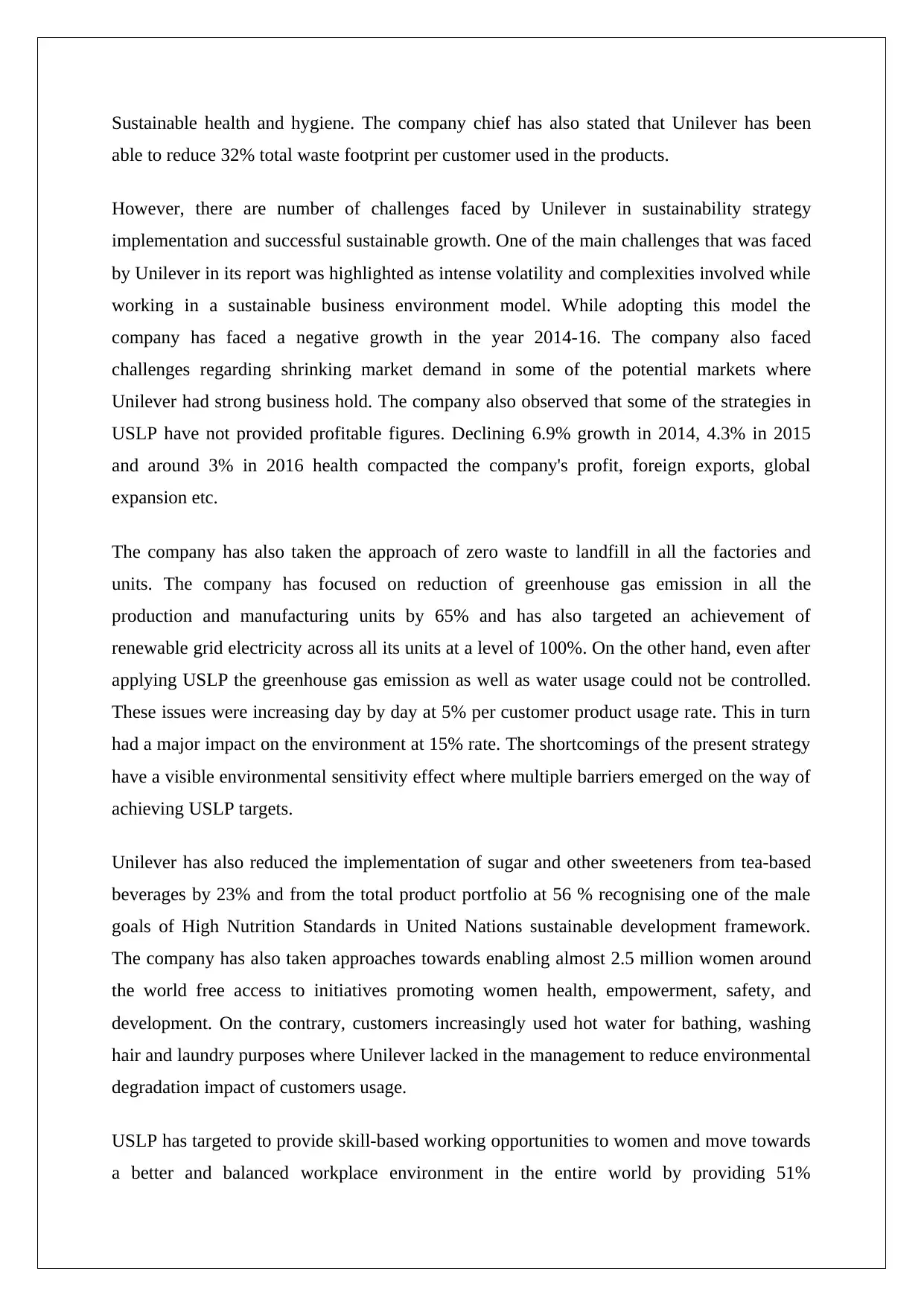
Sustainable health and hygiene. The company chief has also stated that Unilever has been
able to reduce 32% total waste footprint per customer used in the products.
However, there are number of challenges faced by Unilever in sustainability strategy
implementation and successful sustainable growth. One of the main challenges that was faced
by Unilever in its report was highlighted as intense volatility and complexities involved while
working in a sustainable business environment model. While adopting this model the
company has faced a negative growth in the year 2014-16. The company also faced
challenges regarding shrinking market demand in some of the potential markets where
Unilever had strong business hold. The company also observed that some of the strategies in
USLP have not provided profitable figures. Declining 6.9% growth in 2014, 4.3% in 2015
and around 3% in 2016 health compacted the company's profit, foreign exports, global
expansion etc.
The company has also taken the approach of zero waste to landfill in all the factories and
units. The company has focused on reduction of greenhouse gas emission in all the
production and manufacturing units by 65% and has also targeted an achievement of
renewable grid electricity across all its units at a level of 100%. On the other hand, even after
applying USLP the greenhouse gas emission as well as water usage could not be controlled.
These issues were increasing day by day at 5% per customer product usage rate. This in turn
had a major impact on the environment at 15% rate. The shortcomings of the present strategy
have a visible environmental sensitivity effect where multiple barriers emerged on the way of
achieving USLP targets.
Unilever has also reduced the implementation of sugar and other sweeteners from tea-based
beverages by 23% and from the total product portfolio at 56 % recognising one of the male
goals of High Nutrition Standards in United Nations sustainable development framework.
The company has also taken approaches towards enabling almost 2.5 million women around
the world free access to initiatives promoting women health, empowerment, safety, and
development. On the contrary, customers increasingly used hot water for bathing, washing
hair and laundry purposes where Unilever lacked in the management to reduce environmental
degradation impact of customers usage.
USLP has targeted to provide skill-based working opportunities to women and move towards
a better and balanced workplace environment in the entire world by providing 51%
able to reduce 32% total waste footprint per customer used in the products.
However, there are number of challenges faced by Unilever in sustainability strategy
implementation and successful sustainable growth. One of the main challenges that was faced
by Unilever in its report was highlighted as intense volatility and complexities involved while
working in a sustainable business environment model. While adopting this model the
company has faced a negative growth in the year 2014-16. The company also faced
challenges regarding shrinking market demand in some of the potential markets where
Unilever had strong business hold. The company also observed that some of the strategies in
USLP have not provided profitable figures. Declining 6.9% growth in 2014, 4.3% in 2015
and around 3% in 2016 health compacted the company's profit, foreign exports, global
expansion etc.
The company has also taken the approach of zero waste to landfill in all the factories and
units. The company has focused on reduction of greenhouse gas emission in all the
production and manufacturing units by 65% and has also targeted an achievement of
renewable grid electricity across all its units at a level of 100%. On the other hand, even after
applying USLP the greenhouse gas emission as well as water usage could not be controlled.
These issues were increasing day by day at 5% per customer product usage rate. This in turn
had a major impact on the environment at 15% rate. The shortcomings of the present strategy
have a visible environmental sensitivity effect where multiple barriers emerged on the way of
achieving USLP targets.
Unilever has also reduced the implementation of sugar and other sweeteners from tea-based
beverages by 23% and from the total product portfolio at 56 % recognising one of the male
goals of High Nutrition Standards in United Nations sustainable development framework.
The company has also taken approaches towards enabling almost 2.5 million women around
the world free access to initiatives promoting women health, empowerment, safety, and
development. On the contrary, customers increasingly used hot water for bathing, washing
hair and laundry purposes where Unilever lacked in the management to reduce environmental
degradation impact of customers usage.
USLP has targeted to provide skill-based working opportunities to women and move towards
a better and balanced workplace environment in the entire world by providing 51%
Paraphrase This Document
Need a fresh take? Get an instant paraphrase of this document with our AI Paraphraser
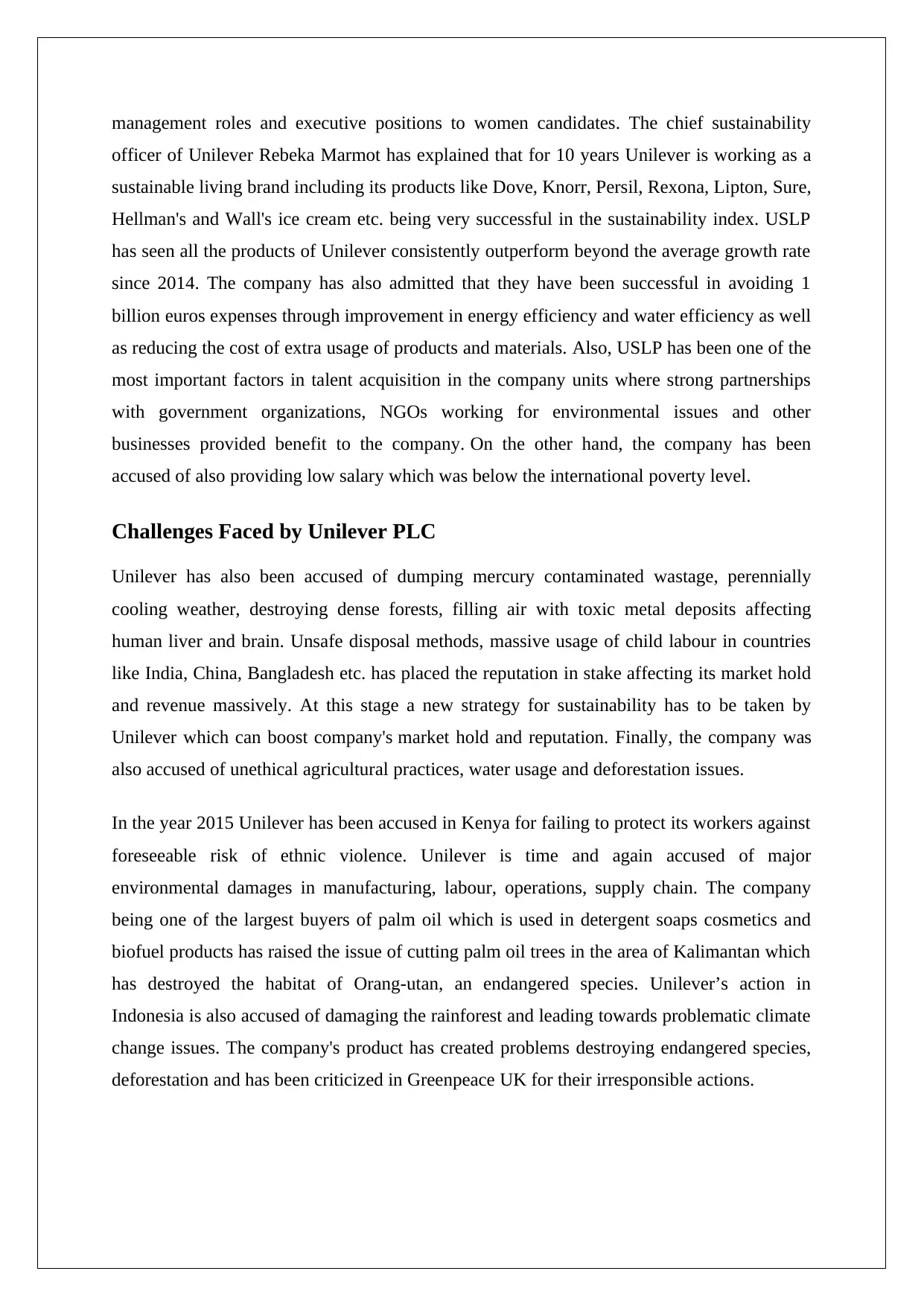
management roles and executive positions to women candidates. The chief sustainability
officer of Unilever Rebeka Marmot has explained that for 10 years Unilever is working as a
sustainable living brand including its products like Dove, Knorr, Persil, Rexona, Lipton, Sure,
Hellman's and Wall's ice cream etc. being very successful in the sustainability index. USLP
has seen all the products of Unilever consistently outperform beyond the average growth rate
since 2014. The company has also admitted that they have been successful in avoiding 1
billion euros expenses through improvement in energy efficiency and water efficiency as well
as reducing the cost of extra usage of products and materials. Also, USLP has been one of the
most important factors in talent acquisition in the company units where strong partnerships
with government organizations, NGOs working for environmental issues and other
businesses provided benefit to the company. On the other hand, the company has been
accused of also providing low salary which was below the international poverty level.
Challenges Faced by Unilever PLC
Unilever has also been accused of dumping mercury contaminated wastage, perennially
cooling weather, destroying dense forests, filling air with toxic metal deposits affecting
human liver and brain. Unsafe disposal methods, massive usage of child labour in countries
like India, China, Bangladesh etc. has placed the reputation in stake affecting its market hold
and revenue massively. At this stage a new strategy for sustainability has to be taken by
Unilever which can boost company's market hold and reputation. Finally, the company was
also accused of unethical agricultural practices, water usage and deforestation issues.
In the year 2015 Unilever has been accused in Kenya for failing to protect its workers against
foreseeable risk of ethnic violence. Unilever is time and again accused of major
environmental damages in manufacturing, labour, operations, supply chain. The company
being one of the largest buyers of palm oil which is used in detergent soaps cosmetics and
biofuel products has raised the issue of cutting palm oil trees in the area of Kalimantan which
has destroyed the habitat of Orang-utan, an endangered species. Unilever’s action in
Indonesia is also accused of damaging the rainforest and leading towards problematic climate
change issues. The company's product has created problems destroying endangered species,
deforestation and has been criticized in Greenpeace UK for their irresponsible actions.
officer of Unilever Rebeka Marmot has explained that for 10 years Unilever is working as a
sustainable living brand including its products like Dove, Knorr, Persil, Rexona, Lipton, Sure,
Hellman's and Wall's ice cream etc. being very successful in the sustainability index. USLP
has seen all the products of Unilever consistently outperform beyond the average growth rate
since 2014. The company has also admitted that they have been successful in avoiding 1
billion euros expenses through improvement in energy efficiency and water efficiency as well
as reducing the cost of extra usage of products and materials. Also, USLP has been one of the
most important factors in talent acquisition in the company units where strong partnerships
with government organizations, NGOs working for environmental issues and other
businesses provided benefit to the company. On the other hand, the company has been
accused of also providing low salary which was below the international poverty level.
Challenges Faced by Unilever PLC
Unilever has also been accused of dumping mercury contaminated wastage, perennially
cooling weather, destroying dense forests, filling air with toxic metal deposits affecting
human liver and brain. Unsafe disposal methods, massive usage of child labour in countries
like India, China, Bangladesh etc. has placed the reputation in stake affecting its market hold
and revenue massively. At this stage a new strategy for sustainability has to be taken by
Unilever which can boost company's market hold and reputation. Finally, the company was
also accused of unethical agricultural practices, water usage and deforestation issues.
In the year 2015 Unilever has been accused in Kenya for failing to protect its workers against
foreseeable risk of ethnic violence. Unilever is time and again accused of major
environmental damages in manufacturing, labour, operations, supply chain. The company
being one of the largest buyers of palm oil which is used in detergent soaps cosmetics and
biofuel products has raised the issue of cutting palm oil trees in the area of Kalimantan which
has destroyed the habitat of Orang-utan, an endangered species. Unilever’s action in
Indonesia is also accused of damaging the rainforest and leading towards problematic climate
change issues. The company's product has created problems destroying endangered species,
deforestation and has been criticized in Greenpeace UK for their irresponsible actions.
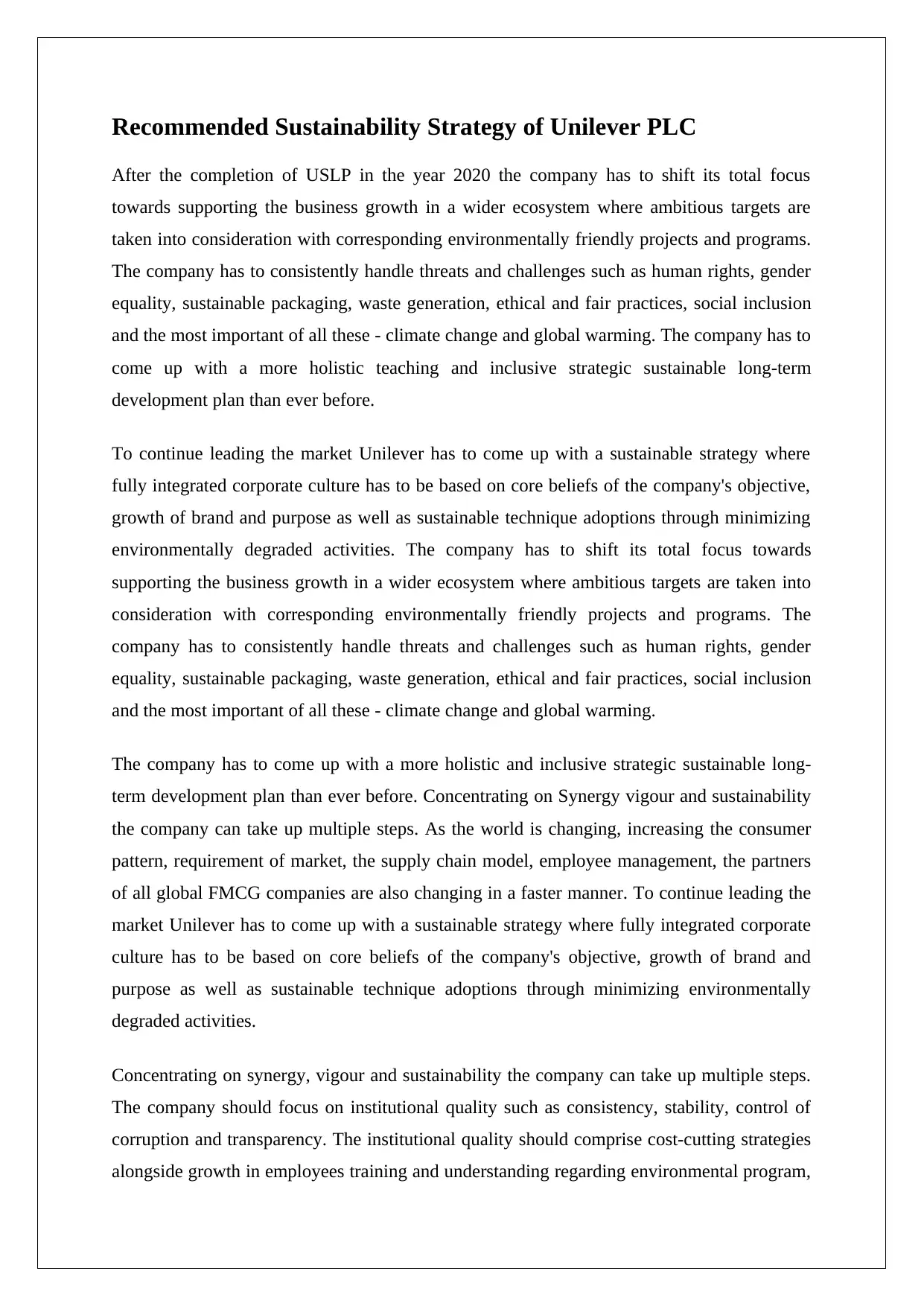
Recommended Sustainability Strategy of Unilever PLC
After the completion of USLP in the year 2020 the company has to shift its total focus
towards supporting the business growth in a wider ecosystem where ambitious targets are
taken into consideration with corresponding environmentally friendly projects and programs.
The company has to consistently handle threats and challenges such as human rights, gender
equality, sustainable packaging, waste generation, ethical and fair practices, social inclusion
and the most important of all these - climate change and global warming. The company has to
come up with a more holistic teaching and inclusive strategic sustainable long-term
development plan than ever before.
To continue leading the market Unilever has to come up with a sustainable strategy where
fully integrated corporate culture has to be based on core beliefs of the company's objective,
growth of brand and purpose as well as sustainable technique adoptions through minimizing
environmentally degraded activities. The company has to shift its total focus towards
supporting the business growth in a wider ecosystem where ambitious targets are taken into
consideration with corresponding environmentally friendly projects and programs. The
company has to consistently handle threats and challenges such as human rights, gender
equality, sustainable packaging, waste generation, ethical and fair practices, social inclusion
and the most important of all these - climate change and global warming.
The company has to come up with a more holistic and inclusive strategic sustainable long-
term development plan than ever before. Concentrating on Synergy vigour and sustainability
the company can take up multiple steps. As the world is changing, increasing the consumer
pattern, requirement of market, the supply chain model, employee management, the partners
of all global FMCG companies are also changing in a faster manner. To continue leading the
market Unilever has to come up with a sustainable strategy where fully integrated corporate
culture has to be based on core beliefs of the company's objective, growth of brand and
purpose as well as sustainable technique adoptions through minimizing environmentally
degraded activities.
Concentrating on synergy, vigour and sustainability the company can take up multiple steps.
The company should focus on institutional quality such as consistency, stability, control of
corruption and transparency. The institutional quality should comprise cost-cutting strategies
alongside growth in employees training and understanding regarding environmental program,
After the completion of USLP in the year 2020 the company has to shift its total focus
towards supporting the business growth in a wider ecosystem where ambitious targets are
taken into consideration with corresponding environmentally friendly projects and programs.
The company has to consistently handle threats and challenges such as human rights, gender
equality, sustainable packaging, waste generation, ethical and fair practices, social inclusion
and the most important of all these - climate change and global warming. The company has to
come up with a more holistic teaching and inclusive strategic sustainable long-term
development plan than ever before.
To continue leading the market Unilever has to come up with a sustainable strategy where
fully integrated corporate culture has to be based on core beliefs of the company's objective,
growth of brand and purpose as well as sustainable technique adoptions through minimizing
environmentally degraded activities. The company has to shift its total focus towards
supporting the business growth in a wider ecosystem where ambitious targets are taken into
consideration with corresponding environmentally friendly projects and programs. The
company has to consistently handle threats and challenges such as human rights, gender
equality, sustainable packaging, waste generation, ethical and fair practices, social inclusion
and the most important of all these - climate change and global warming.
The company has to come up with a more holistic and inclusive strategic sustainable long-
term development plan than ever before. Concentrating on Synergy vigour and sustainability
the company can take up multiple steps. As the world is changing, increasing the consumer
pattern, requirement of market, the supply chain model, employee management, the partners
of all global FMCG companies are also changing in a faster manner. To continue leading the
market Unilever has to come up with a sustainable strategy where fully integrated corporate
culture has to be based on core beliefs of the company's objective, growth of brand and
purpose as well as sustainable technique adoptions through minimizing environmentally
degraded activities.
Concentrating on synergy, vigour and sustainability the company can take up multiple steps.
The company should focus on institutional quality such as consistency, stability, control of
corruption and transparency. The institutional quality should comprise cost-cutting strategies
alongside growth in employees training and understanding regarding environmental program,
⊘ This is a preview!⊘
Do you want full access?
Subscribe today to unlock all pages.

Trusted by 1+ million students worldwide
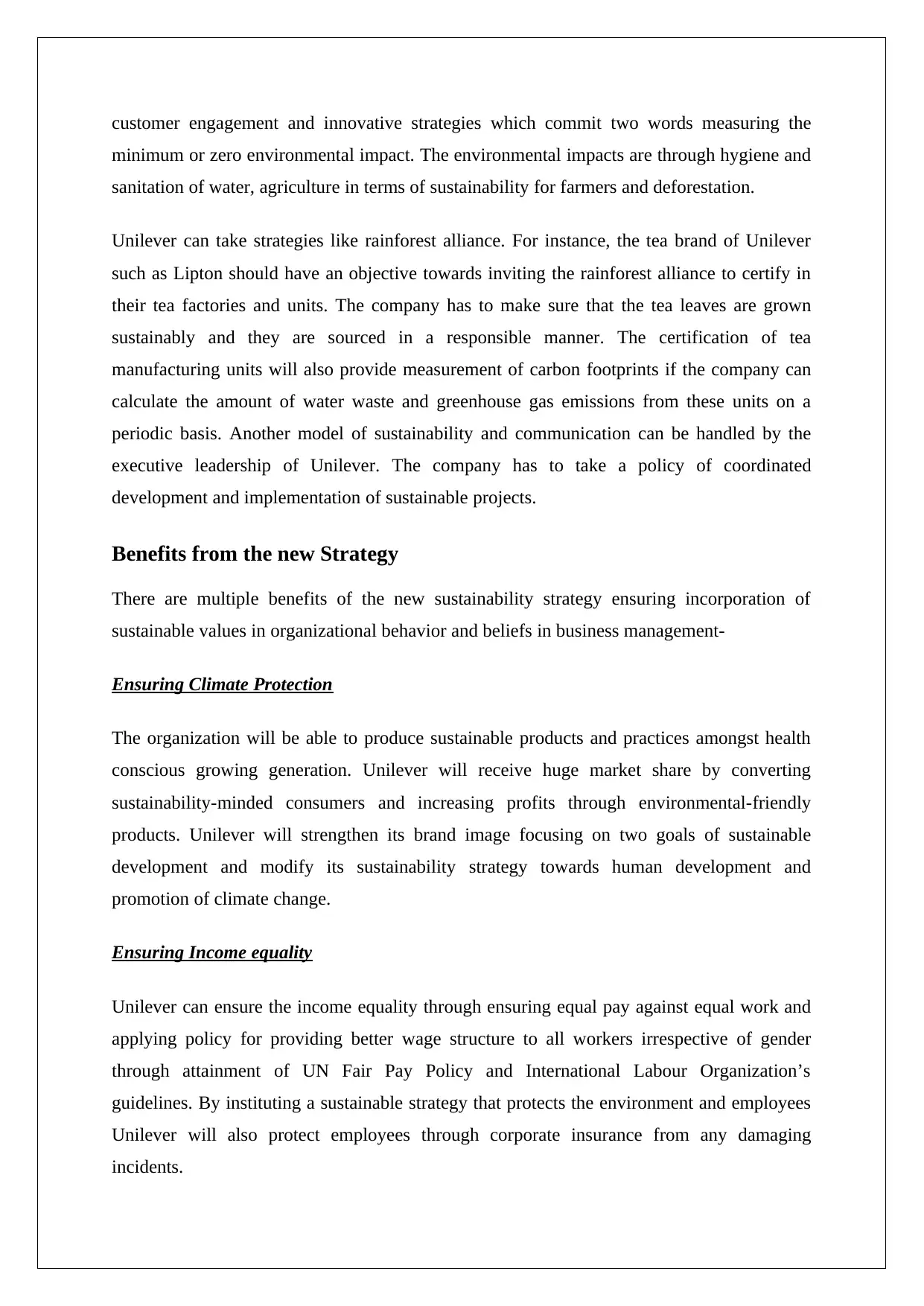
customer engagement and innovative strategies which commit two words measuring the
minimum or zero environmental impact. The environmental impacts are through hygiene and
sanitation of water, agriculture in terms of sustainability for farmers and deforestation.
Unilever can take strategies like rainforest alliance. For instance, the tea brand of Unilever
such as Lipton should have an objective towards inviting the rainforest alliance to certify in
their tea factories and units. The company has to make sure that the tea leaves are grown
sustainably and they are sourced in a responsible manner. The certification of tea
manufacturing units will also provide measurement of carbon footprints if the company can
calculate the amount of water waste and greenhouse gas emissions from these units on a
periodic basis. Another model of sustainability and communication can be handled by the
executive leadership of Unilever. The company has to take a policy of coordinated
development and implementation of sustainable projects.
Benefits from the new Strategy
There are multiple benefits of the new sustainability strategy ensuring incorporation of
sustainable values in organizational behavior and beliefs in business management-
Ensuring Climate Protection
The organization will be able to produce sustainable products and practices amongst health
conscious growing generation. Unilever will receive huge market share by converting
sustainability-minded consumers and increasing profits through environmental-friendly
products. Unilever will strengthen its brand image focusing on two goals of sustainable
development and modify its sustainability strategy towards human development and
promotion of climate change.
Ensuring Income equality
Unilever can ensure the income equality through ensuring equal pay against equal work and
applying policy for providing better wage structure to all workers irrespective of gender
through attainment of UN Fair Pay Policy and International Labour Organization’s
guidelines. By instituting a sustainable strategy that protects the environment and employees
Unilever will also protect employees through corporate insurance from any damaging
incidents.
minimum or zero environmental impact. The environmental impacts are through hygiene and
sanitation of water, agriculture in terms of sustainability for farmers and deforestation.
Unilever can take strategies like rainforest alliance. For instance, the tea brand of Unilever
such as Lipton should have an objective towards inviting the rainforest alliance to certify in
their tea factories and units. The company has to make sure that the tea leaves are grown
sustainably and they are sourced in a responsible manner. The certification of tea
manufacturing units will also provide measurement of carbon footprints if the company can
calculate the amount of water waste and greenhouse gas emissions from these units on a
periodic basis. Another model of sustainability and communication can be handled by the
executive leadership of Unilever. The company has to take a policy of coordinated
development and implementation of sustainable projects.
Benefits from the new Strategy
There are multiple benefits of the new sustainability strategy ensuring incorporation of
sustainable values in organizational behavior and beliefs in business management-
Ensuring Climate Protection
The organization will be able to produce sustainable products and practices amongst health
conscious growing generation. Unilever will receive huge market share by converting
sustainability-minded consumers and increasing profits through environmental-friendly
products. Unilever will strengthen its brand image focusing on two goals of sustainable
development and modify its sustainability strategy towards human development and
promotion of climate change.
Ensuring Income equality
Unilever can ensure the income equality through ensuring equal pay against equal work and
applying policy for providing better wage structure to all workers irrespective of gender
through attainment of UN Fair Pay Policy and International Labour Organization’s
guidelines. By instituting a sustainable strategy that protects the environment and employees
Unilever will also protect employees through corporate insurance from any damaging
incidents.
Paraphrase This Document
Need a fresh take? Get an instant paraphrase of this document with our AI Paraphraser
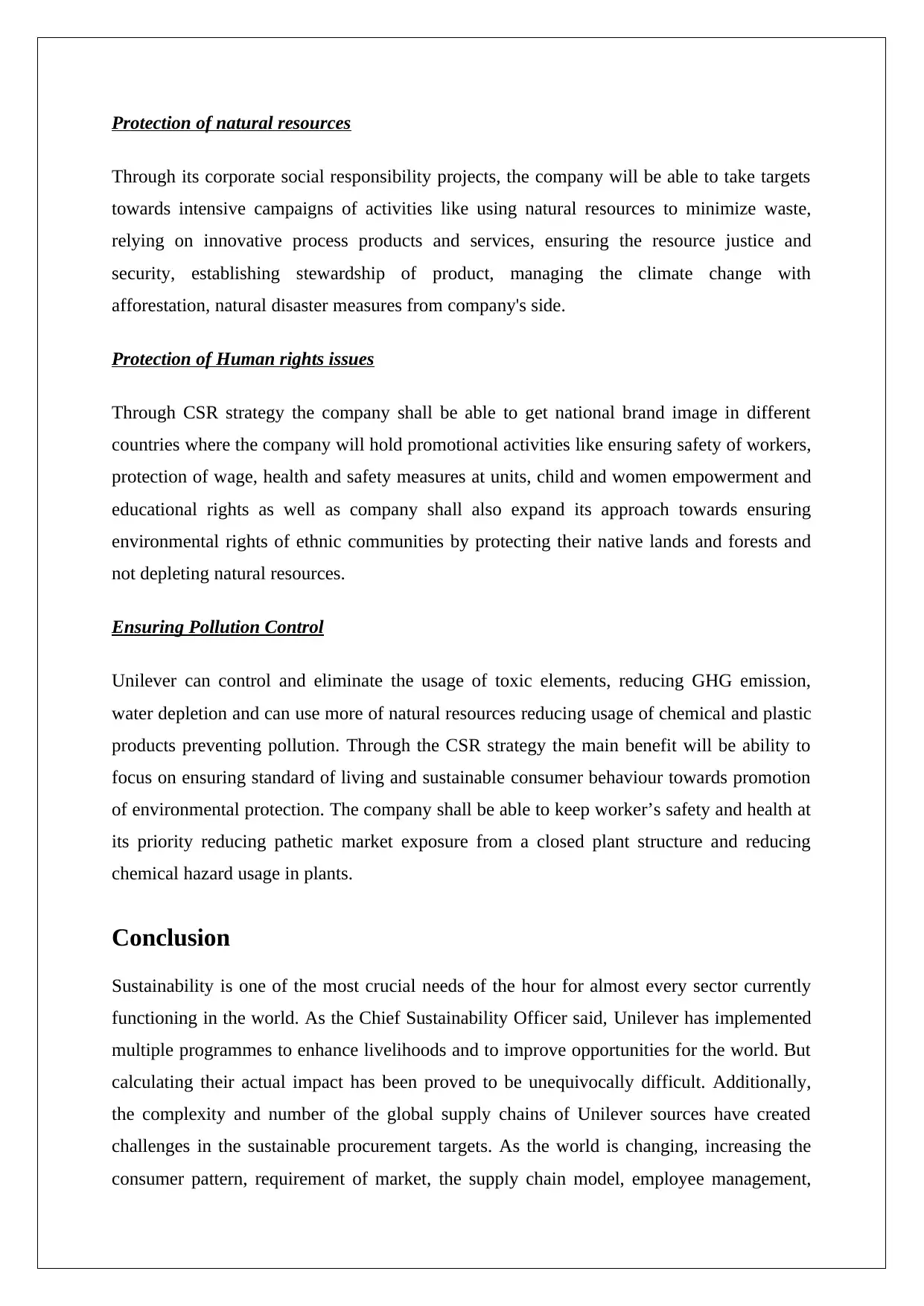
Protection of natural resources
Through its corporate social responsibility projects, the company will be able to take targets
towards intensive campaigns of activities like using natural resources to minimize waste,
relying on innovative process products and services, ensuring the resource justice and
security, establishing stewardship of product, managing the climate change with
afforestation, natural disaster measures from company's side.
Protection of Human rights issues
Through CSR strategy the company shall be able to get national brand image in different
countries where the company will hold promotional activities like ensuring safety of workers,
protection of wage, health and safety measures at units, child and women empowerment and
educational rights as well as company shall also expand its approach towards ensuring
environmental rights of ethnic communities by protecting their native lands and forests and
not depleting natural resources.
Ensuring Pollution Control
Unilever can control and eliminate the usage of toxic elements, reducing GHG emission,
water depletion and can use more of natural resources reducing usage of chemical and plastic
products preventing pollution. Through the CSR strategy the main benefit will be ability to
focus on ensuring standard of living and sustainable consumer behaviour towards promotion
of environmental protection. The company shall be able to keep worker’s safety and health at
its priority reducing pathetic market exposure from a closed plant structure and reducing
chemical hazard usage in plants.
Conclusion
Sustainability is one of the most crucial needs of the hour for almost every sector currently
functioning in the world. As the Chief Sustainability Officer said, Unilever has implemented
multiple programmes to enhance livelihoods and to improve opportunities for the world. But
calculating their actual impact has been proved to be unequivocally difficult. Additionally,
the complexity and number of the global supply chains of Unilever sources have created
challenges in the sustainable procurement targets. As the world is changing, increasing the
consumer pattern, requirement of market, the supply chain model, employee management,
Through its corporate social responsibility projects, the company will be able to take targets
towards intensive campaigns of activities like using natural resources to minimize waste,
relying on innovative process products and services, ensuring the resource justice and
security, establishing stewardship of product, managing the climate change with
afforestation, natural disaster measures from company's side.
Protection of Human rights issues
Through CSR strategy the company shall be able to get national brand image in different
countries where the company will hold promotional activities like ensuring safety of workers,
protection of wage, health and safety measures at units, child and women empowerment and
educational rights as well as company shall also expand its approach towards ensuring
environmental rights of ethnic communities by protecting their native lands and forests and
not depleting natural resources.
Ensuring Pollution Control
Unilever can control and eliminate the usage of toxic elements, reducing GHG emission,
water depletion and can use more of natural resources reducing usage of chemical and plastic
products preventing pollution. Through the CSR strategy the main benefit will be ability to
focus on ensuring standard of living and sustainable consumer behaviour towards promotion
of environmental protection. The company shall be able to keep worker’s safety and health at
its priority reducing pathetic market exposure from a closed plant structure and reducing
chemical hazard usage in plants.
Conclusion
Sustainability is one of the most crucial needs of the hour for almost every sector currently
functioning in the world. As the Chief Sustainability Officer said, Unilever has implemented
multiple programmes to enhance livelihoods and to improve opportunities for the world. But
calculating their actual impact has been proved to be unequivocally difficult. Additionally,
the complexity and number of the global supply chains of Unilever sources have created
challenges in the sustainable procurement targets. As the world is changing, increasing the
consumer pattern, requirement of market, the supply chain model, employee management,
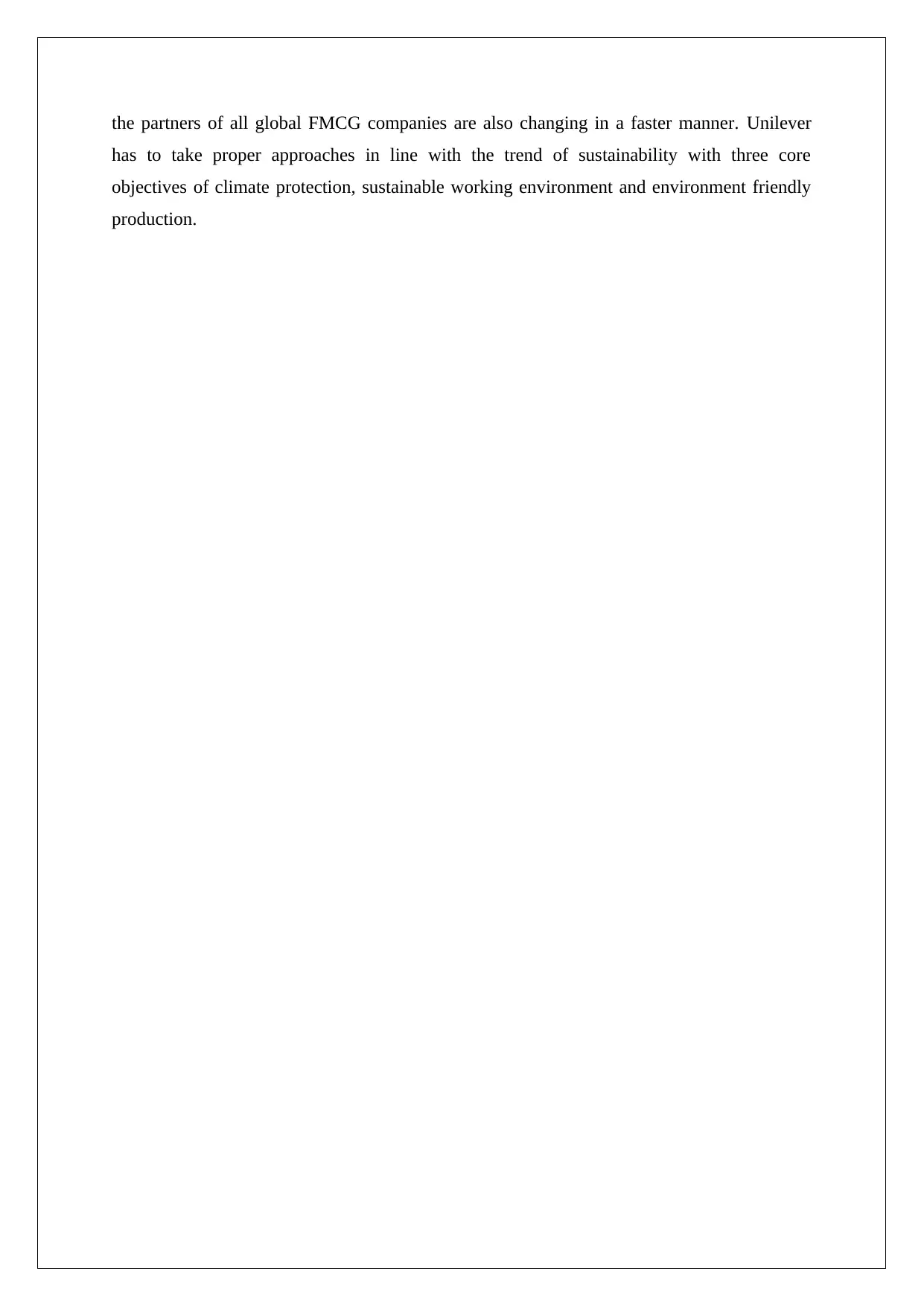
the partners of all global FMCG companies are also changing in a faster manner. Unilever
has to take proper approaches in line with the trend of sustainability with three core
objectives of climate protection, sustainable working environment and environment friendly
production.
has to take proper approaches in line with the trend of sustainability with three core
objectives of climate protection, sustainable working environment and environment friendly
production.
⊘ This is a preview!⊘
Do you want full access?
Subscribe today to unlock all pages.

Trusted by 1+ million students worldwide
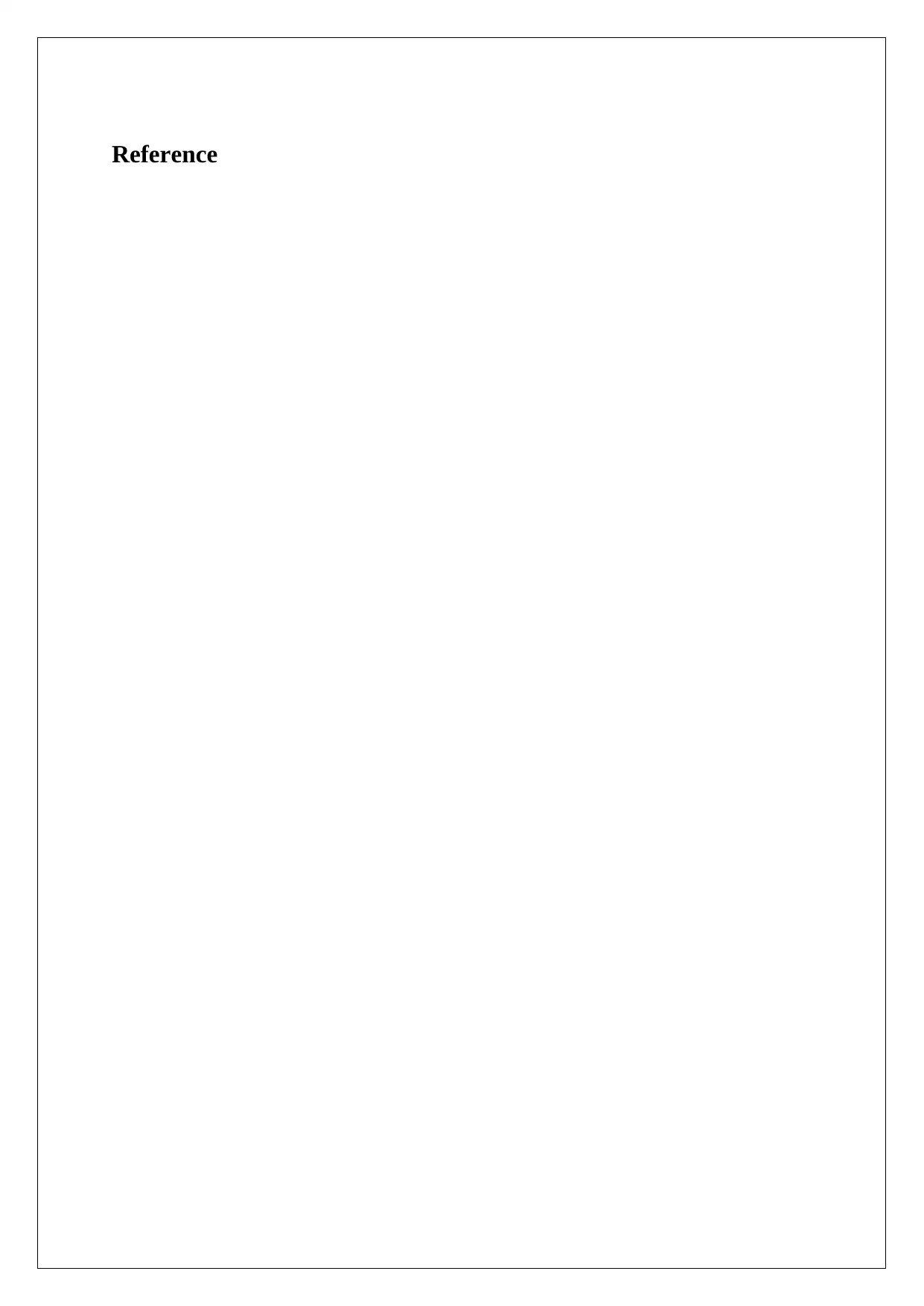
Reference
1 out of 10
Related Documents
Your All-in-One AI-Powered Toolkit for Academic Success.
+13062052269
info@desklib.com
Available 24*7 on WhatsApp / Email
![[object Object]](/_next/static/media/star-bottom.7253800d.svg)
Unlock your academic potential
Copyright © 2020–2025 A2Z Services. All Rights Reserved. Developed and managed by ZUCOL.





